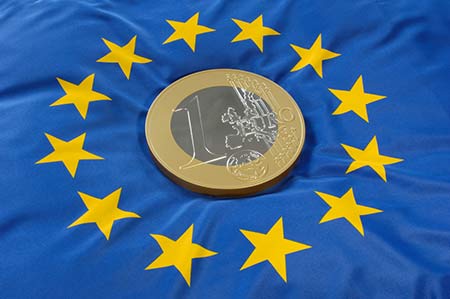The Euro to Pound Sterling (EUR/GBP) exchange rate softened from its earlier highs on Wednesday as Eurozone retail sales came in below economist expectations and UK Service Sector PMI data beat forecasts.
The Euro to Pound Sterling (EUR/GBP) Exchange Rate Touched A Session High Of 0.7420 Earlier In the Session
The Euro made gains against the Pound and other major peers early in the session as data released by Markit showed that Eurozone businesses started the second quarter of the year with healthy growth levels and have seen an improvement in orders.
Improved data out of Spain and Italy was joined by better than forecast Eurozone PMI data and news that Greece managed to pay off a €200 million interest payment to the International Monetary Fund (IMF). The successful payment eased some of the concerns that Greece could default next week when it must pay back a much larger sum to its creditors.
Data showed that Spanish service sector PMI rose to a reading of 60.3 in April, a rise from the 57.3 seen in March. Italy’s service sector PMI also came in strongly and advanced to a 10-month high level of 53.1. The Eurozone Composite PMI meanwhile came in at 53.9 for April, higher than economist expectations for a reading of 53.7. The region’s Services PMI came in at 54.1, better than the 53.5 level forecast.
‘The fact that the rate of growth failed to gain further momentum is a disappointment, but the national growth variations will give policymakers some real encouragement that the economic health of the region is improving,’ said Chris Williamson, chief economist at Markit.
As the session progressed, the Pound managed to regain lost ground as data showed that the UK’s dominant services sector expanded at its fastest pace in 8-months in April. The Services PMI increased from the 58.9 seen in March to 59.5 in April. The data eased some of the fears that the UK economy was faltering. Further gains were restrained as investors turn their attention to Thursday’s general election, the result of which is far from certain.
The Euro then came under pressure as Eurozone retail sales data came in below expectations in March.
According to Eurostat, retail sales across the currency bloc fell 0.8% on a month-on-month basis. On an annual basis retail sales rose by 1.6%, well below expectations for a rise to 2.4%. The data marked the first drop in sales since September 2014.
The EUR/GBP exchange rate is forecast to experience volatility on Thursday and Friday as the UK general election is set to dominate sentiment.



